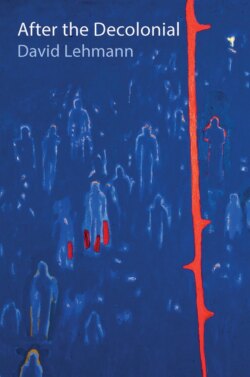Читать книгу After the Decolonial - David Lehmann - Страница 9
Glossary
Оглавлениеayllu –autonomous communal authority overseeing land allocation among households in highland Bolivian communitiescabildo –council of a community or localitycaboclos –people of mixed race (Indian, black, white) in Amazonia; also spirits that assume innumerable forms as their presence is detected or summoned by a mediumcalidad indígena –legally recognized indigenous statuscampesino –peasant or small farmerCandomblé –type of possession cult in the Yoruba traditioncapilaridade –capacity of asocial movement to penetrate deep among the interstices of a social milieucholas, cholos –persons of mixed race or intermediate social status in the Andean socio-racial hierarchycimarronaje –having features in common with escaped slaves (cimarrones)cocaleros –coca growerscolonos –colonists who come from outside and bring ‘uncultivated’ land under the plough or who occupy territory where the state is virtually absent. Usually, these lands and territories are used and occupied by indigenous peoplescompadre –co-godparentcriollo –of mixed white and indigenous race; also means native to or bred in the Americas (but not indigenous)despatriarcalización –process of removing patriarchal features from societyejido –form of quasi-collective land tenure under the Mexican Agrarian Reformestética negra –a politically nuanced style of dress and hair fashionable among young black people in Brazil, especially Bahiainterculturalidad –an approach to education and institutional arrangements that recognizes indigenous heritage and encourages indigenous participation and the learning of indigenous languages and cultureladinos –elite predominantly white people constituting a quasi-caste in Guatemalamachis –Mapuche shamans (mostly women)malandragem –roguishnessmandar obedeciendo –‘to lead while obeying’ (said to be a Tojolabal motto)media luna –‘crescent moon’: the lowland region of Bolivia comprising the departments of Tarija, Pando, Beni and Santa Cruzmestizo –light-skinnedmoreno –brown-skinnedmovimento negro –black movementoriginario –founding, as in nación originaria, referring to indigenous ethno-linguistic groupsparamilitares –‘paramilitaries’, organized groups who engage in violent action against Indians and social and indigenous activists, and nominally against guerrillas, in Colombiapardo –brown; used in official statistics and classification in Brazilpreto –literally ’black’, denoting the deepest black skin colour; a term mostly used in Brazil in official statistics and classifications, which do not use negroquilombo, quilombola –settlements of escaped slaves and the people who live in themregiones de refugio –literally refuge zones, referring to isolated regions with predominantly Indian populations living outside the market economyresguardos –the institutional form of indigenous ownership of land in Colombiasaudade –a distinctively Brazilian nostalgic sadness or sense of loss, and associated musical stylessindicatos campesinos –peasant unions (Bolivia)tercermundista –supporter of a nationalist, anti-imperialist worldview which opposes the countries of the global South (formerly ‘Third World ‘) to Europe and the United Statesterreiros –sites of Candomblé ceremoniesusos y costumbres –customs and traditions of indigenous people
